Professor Philip Alston, UN Special Rapporteur on extreme poverty and human rights
Michael Goldhaber, IBA US CorrespondentMonday 14 October 2019

Over the past few years, Philip Alston, UN Special Rapporteur on extreme poverty and human rights, has challenged governments around the world on their lack of political will to address poverty. He speaks to the IBA US Correspondent, Michael Goldhaber, about the injustice of wealth inequality in the US.
Michael Goldhaber: When you presented the findings of your US country visit, then US ambassador to the UN Nikki Haley scoffed: ‘it is patently ridiculous for the UN to examine poverty in America.’ So why is she wrong?
Professor Philip Alston: If 40 million people living in poverty is not a human rights issue and not something that external scrutiny should be focused on, I’m not sure what is. I guess that every country thinks that its human rights record is fine and that the UN should be focusing elsewhere, but it’s clear that the US has a blind spot on a lot of these issues. It’s very important for the international community to shine a spotlight on the extent of poverty in the US and the implications that has for the enjoyment of civil and political rights in this country.
MG: You said that there was a sharp contrast between the attitude of US officials and those in other nations you visited. Have you found that officials are more committed to addressing the problems, or is denial a universal condition?
Above: Watch interview with Philip Alston
PA: The US is different in the sense that it doesn’t recognise social rights – it doesn’t accept a right to healthcare, for example, let alone the right to housing. In other countries, at least in Western Europe, that’s taken for granted. The levels can be debated, but there’s no question that the government must ensure that its citizens have those basics.
In terms of reaction to critical reports, that’s more of a universal phenomenon. No government wants to be criticised. They’re going to try to discredit it in some way, but that’s not the key issue. The key issue is what does the government really do about it? And where there’s the political will, governments, having said ‘we don’t like the report’, will then start trying to address the key issues. Where there is no political will, they will simply dismiss it and move on.
There are endless ways in which the criminal justice system is now being set up to penalise the poor and ensure that their future is much grimmer than their past has been
MG: American exceptionalism is taken as an article of faith in this country. So, in what ways, positive or negative, did you find us to be exceptional?
PA: The US is clearly exceptional in terms of its social welfare programmes. They are very intermittent, deliberately inadequate, premised on sort of libertarian assumptions. I think that certainly makes it different from most other developed countries. America is exceptional in the sense that there’s a real openness to public debate. There’s a really vibrant civil society. There were lots of groups that were very keen to engage. There’s a Congress which has quite a few members who were fully engaged with my reporting and who made an issue of it afterwards and so on. I think the US has both good and bad aspects of exceptionalism.
MG: You talked about the country having an ethos that the rich and poor deserve what they have; that the poor are takers and scammers. You also talked about the American Dream turning into the ‘American Illusion’.
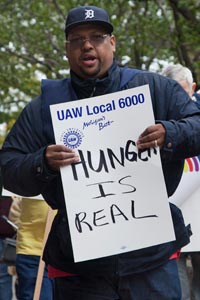
Protesting welfare cuts © Alamy
PA: I think the conservatives, over the past 40 years or so, have really hammered this view that anyone who is on welfare is basically doing it unnecessarily and has intentionally made themselves a burden on the state. We are encouraged to see that anyone who’s receiving welfare really could be out working instead. No account is taken of all of the things that befall average people in terms of bad medical health, mental health challenges, what happens to their kids, car and industrial accidents, and so on. Lots of people are simply unable to work and need to have decent support. That’s not factored into the US mentality when we think of welfare. In terms of social mobility, the sad reality of the ‘Great American Dream’, which people still believe in very firmly, is that statistically the US is less mobile than almost any other developed country. You have a better chance in countries like the UK, which used to be very hidebound, on being able to move from one low income group to a much higher one through your own effort.
MG: In its official response to the UN, the Trump administration offered some very different statistics from yours. They made the claim, which demographers called a joke, that only 250,000 Americans are in extreme poverty. What do you regard as the most meaningful measures of poverty in the US?
PA: One can debate that endlessly. But to suddenly say that ‘no, the figure of 40 million is wrong, and it really should be replaced by something like 300,000’, is ludicrous. One can always do this on the basis of statistics, but it’s also important just to look around you, to open your eyes. We know the sort of poverty that exists in most of the large cities in the US, we know the extent of rural poverty in areas from which employment opportunities have disappeared. There is a huge amount of poverty that’s not really being addressed. And when you meet the people who are living in those conditions, they don’t have access to dental care for example – nothing. If they are in acute pain, they can go to an emergency room, which might extract a tooth. They don’t have access to a doctor except in a dire emergency. It makes it much harder to get work. Their kids are very badly off, receiving a low-quality education and so on. To say that there isn’t any real poverty in the US is not to look around the country.
MG: You wrote about the US leading the OECD in infant mortality, youth poverty, obesity, incarceration rate, second-to-last in sanitation. And perhaps most striking is that the US now leads its peer nations in inequality in the OECD.
PA: Just at the end of my visit to the US, the World Health Organization announced that China had actually overtaken the US in terms of healthy life expectancy for a child born today. Now, China is still a very uneven country – it might be rich in global terms, but per capita it’s way below the US – but for it to have a better healthy life expectancy is truly shocking. Skid Row [downtown Los Angeles] was an amazing experience because you are right in the shadow of a thriving and prosperous central business district and within a few hundred yards you can see the ‘other side’ of life.
In Skid Row there are cities of tents, and toilets are provided at a ratio that wouldn’t be acceptable in a refugee camp in Syria. Leading to people urinating and defecating in the streets.
In Skid Row there are cities of tents, and toilets are provided at a ratio that wouldn’t be acceptable in a refugee camp in Syria
MG: Which is in turn criminalised.
PA: Yes, that’s part of the perversity of it all. Rather than trying to come up with longer-term solutions, the LA police were issuing citations and eventually arresting people at higher rates than they had been for a long time.
And the poor have no serious access to the legal system in the US. Despite all of the rhetoric, public defenders are hugely overworked, hugely underpaid. The sort of services that the poor can access are very grim. They simply can’t really expect to get a decent deal from the courts.
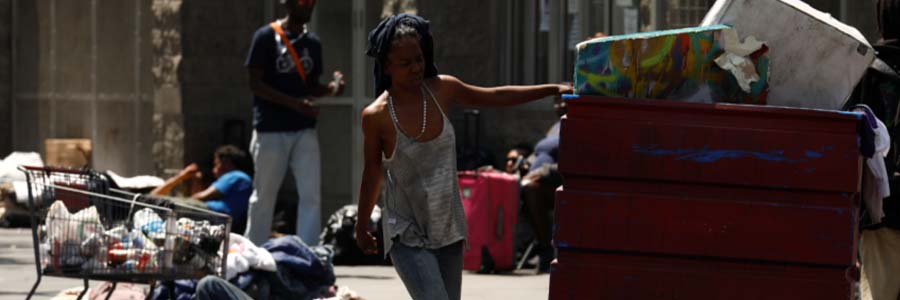
A woman pushes a cart with her belongings past tents and tarps erected by homeless people along streets in the skid row area of downtown Los Angeles, California, US © REUTERS/Patrick T Fallon
MG: You also spoke about the many millions of disenfranchised felons, part of a pattern that you talked about in the criminal justice system.
PA: I think what’s happened is a very determined effort to make people pay for their own access to justice. It’s fine for me as I’m quite well off. If I’m fined, if I have to pay for a night in prison, I can do it. If you take a low-income person, those fines can put them out of the game for years. They have to pay their probation officer. They have to pay to spend nights in county jails. They have to pay high bail amounts.
There are endless ways in which the criminal justice system is now being set up to really penalise the poor and ensure that their future is much grimmer than their past has been.
MG: As you put it, to criminalise poverty leads to a cycle of homelessness, unemployment, imprisonment and disenfranchisement.
PA: And the irony is that Nikki Haley said at one stage, ‘we have never criminalised poverty, there is no law in this country that criminalises poverty.’ Of course that’s such a formalistic reading of it because there isn’t a law that says ‘if you’re poor you should be put in prison’. But there are all these other laws that are designed to benefit the well off and to punish the poor.
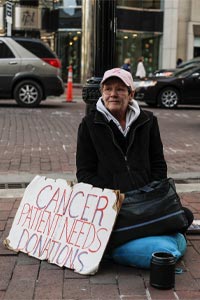
A homeless woman sits in downtown Indianapolis © REUTERS/Zohra Bensemra
MG: You wrote about the link between the decline of political rights and the decline of social and economic rights, especially for minority groups. Would they be so deprived of basic services if they were not also effectively deprived of the vote?
PA: I think it makes a big difference. I quote in the report a senior Democratic politician who said to me, ‘you show me one of my colleagues who is really reaching out to try to get the votes of the poor.
I don’t think there’s any of them because they don’t think these guys are either going to be able or be willing to vote. So they’re not part of the political priority.’
The extent to which there’s been what I call overt and covert disenfranchisement is really quite staggering. For a country that prides itself on being one of the original democracies and really having a thriving democratic culture, that’s increasingly less true because of all the steps that have been taken to exclude millions of voters.
MG: A lot has changed since your tour in December 2017 and the report in June 2018. What new developments do you find the most discouraging?
PA: The enormous storm cloud that hovers over the US is the consequences of the gigantic tax cut that took place at the time of my visit. The President is now talking about further tax cuts, while anyone who’s looking at the state of the economy says this is all completely unsustainable. There’s going to need to be major cuts or major increases in taxes. We know that the agenda is to set the stage for saying ‘we can’t afford the welfare system we have’.
The next step will certainly be an even more concerted effort – not just by the President, which has taken place for the last two or three years anyway – but soon by the Republicans in Congress who have been relatively quiet on a lot of these issues. Having secured massive tax cuts, they will say ‘we have no choice but to cut back on whether it’s Medicare or Medicaid, whether it’s food stamps, we just have to cut radically’. And that’s going to lead to much greater poverty in the country.
The US is different in the sense that it doesn’t recognise social rights – it doesn’t accept a right to healthcare, for example, let alone the right to housing
MG: You allude to the plight of the middle class in your recommendations – is middle-class insecurity a human rights issue that deserves more attention?
PA: If we look at the rise of populism around the world, a lot of people would say that it is linked to basic economic insecurity on the part of those who are not living in poverty but are at risk. The statistic that something like 40 per cent of Americans couldn’t afford a $400 emergency expense without plunging into poverty, or without having to take out a loan that they can’t afford, indicates that there’s a large percentage of people who are living on the edge.
I think if you take a holistic view, what a society should be doing is providing a basic but assured safety net. So if people do fall through the net, there really will be a full range of different forms of assistance to help them to get back on their feet. That’s just not the case in the US. We’ve seen the Trump administration each year proposing drastic cuts that Congress hasn’t so far accepted, but food stamps are being cut back, Medicare eligibility is being made more difficult. What does exist of a social safety net is being chipped away at a pretty significant rate.
Professor Alston spoke to Jennifer Sadler-Venis, IBA Content Editor, about poverty in the UK, holding the government to account for continued inaction and the potential impact of Brexit on the country’s poorest.
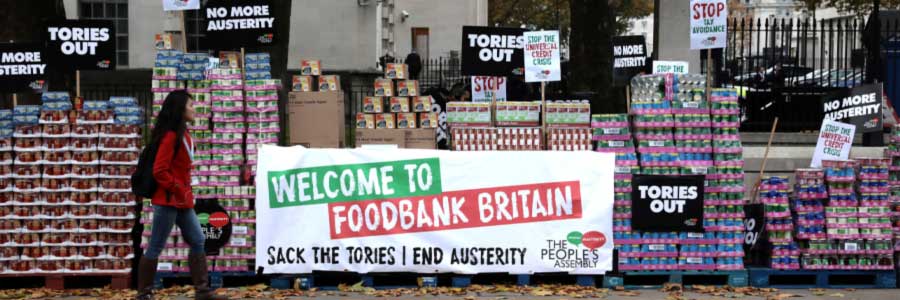
Anti-austerity campaign organisation The People’s Assembly dump stacks of food opposite Downing Street, London © REUTERS/Simon Dawson
JSV: What is the impact of the focus on employment as a cure for poverty and what should the focus be instead?
PA: For a serious programme to eliminate or greatly reduce poverty, there needs to be a wide range of social services available to people who are not able to take advantage of work opportunities. The wages that are paid need to be adequate, and those who are not earning enough through work need to have access to the social security benefits that used to be available before the austerity programme started systematically chopping them down.
JSV: The UK government has said they’re going to end austerity. How much difference will that make now?
PA: I don’t think austerity can be ended. What they may do is enable benefits to rise with inflation, they might take some of the caps off, but austerity is really the great harm that has been done to the social fabric of the UK over the past ten years. Ending austerity in that sense would require a whole range of measures to restore the capacities of local councils, for example, to provide the full gamut of services that people desperately need. And there’s no proposal that I’ve seen that intends to do that. So the term ‘ending austerity’ is close to misleading advertising.
JSV: How can we hold legislators accountable for their lack of political will to tackle poverty?
PA: Only politically. We need to expose the responsibility of governments for the outcomes we’re seeing. The link between the very deliberately planned austerity policies and social misery in the UK needs to be spelled out. I’d like to see the opposition parties taking poverty more seriously.
I think the tragedy of Brexit has been that every other issue has been drowned out and that may be a convenient outcome for some groups that simply want to push ahead with the neo-liberal agenda and not focus on any of these deep social challenges that are going to transform 21st century Britain.
JSV: As Prime Minister, Boris Johnson seems to be propelling the country to a no-deal Brexit, and the government recently released the Yellowhammer document, which outlines its no-deal assumptions. The document states that ‘low income groups will be disproportionately affected’ by food shortages and that ‘providers of adult social care could fail’. Are you more concerned now about Brexit’s impact?
PA: It was always apparent from the various Treasury estimates that those who are not well off would be the hardest hit. The Operation Yellowhammer document confirms part of that, but I don’t think it gives anything like a full picture. The real problem is that as far as I know nothing is being done to shield those people. So there will be a significant percentage of people – maybe the poorest 20 per cent or so – who will be extremely hard hit by a no-deal Brexit and the government apparently has no plans to soften those blows.
JSV: What role should the legal profession play in tackling poverty?
PA: Lawyers have an obligation to be promoting justice and a fair society. Lawyers haven’t stood idly by in response to the cuts to legal aid but I think they should be speaking out more strongly and exposing the extent to which justice is increasingly only available to the wealthy. As a profession, if law is not able to promote justice then we need to ask ourselves what we’re really about.
MG: You wrote, soon after President Trump’s inauguration, about the challenge posed to human rights by his distinct approach to governance, which you suggested combines elements of unilateralism and deregulation with inequality and a drift toward authoritarianism. What are the human rights implications of that toxic mix?
PA: There’s both the domestic and the international. International implications, which are perhaps of the least importance to the American people, are an assault on the UN, an assault on multilateralism, a refusal to cooperate with other states, a refusal to take up a lot of the most pressing human rights issues unless they fit a very narrow ideological position. Domestically, I think what we’ve seen is a pretty dramatic move away from the various protections against discrimination that exist in the country.
We’ve seen a downgrading of a lot of the institutions that were set up to try to keep a check on ensuring respect for people’s rights. A lot of the deregulation removing regulations against use of toxic chemicals, against environmental pollution and various other things, are clearly an assault on the rights of the poor.
It’s staggering to be in Puerto Rico, for example, in some of the poor areas and see giant mountains of coal ash, completely unprotected, just waiting for the next strong wind to come and blow them around the neighbourhood and for people to be breathing them in.
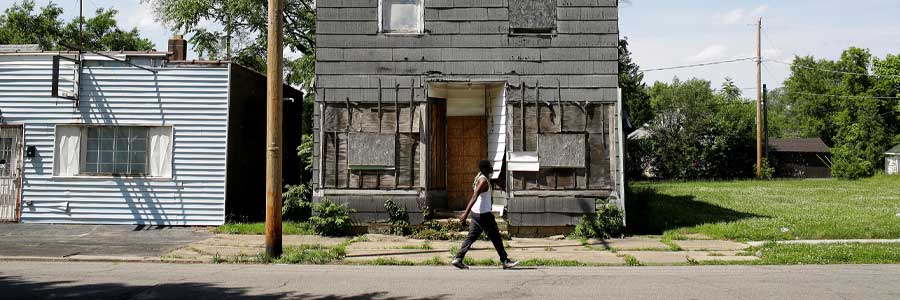
A man walks past a boarded up home in South Bend, Indiana, US © REUTERS/Joshua Lott
MG: What events since your official visit do you find heartening?
PA: This is perhaps a self-centred comment, but the degree of attention that the report received. It received very extensive media coverage, it’s been taken up by a lot of civil society groups and so on. I think there is a growing awareness of the fact that the existing poverty levels not only are not acceptable in their own right, but more importantly, that they have serious human rights implications. So even if you don’t care about the economics of it, if you just care about the civil rights dimension of the US, then poverty has to be addressed.
MG: If you look at the agenda of the Democratic presidential hopefuls, it’s remarkable how much it tracks the rest of your policy recommendations. The month after your report, California took your first recommendation and ended cash bail. How encouraged are you by these ideas?
PA: It is very encouraging. There are two things that are going on that I see. One is actually just a return to a longstanding American concern with the poor. Whether we go back to Franklin D Roosevelt’s ‘New Deal’ or to Lyndon B Johnson’s grand assault on poverty, this is not a new set of issues in the US. It’s just that the country has lost sight of them over the last 30 years or so.
The second thing that’s going on is not just what some would see as a great revival of the left, but is the realisation even from the right, that in fact a lot of these initiatives would be economically productive. So you have the IMF, for example, coming out and saying extreme inequality is very bad for growth. It’s not sustainable. It is not the best economic move.
A lot of these programmes can actually be justified in terms of increasing productivity, giving every kid a decent education, providing more pre-school care. That’s purely an economic investment in a smarter society; one that’s able to have higher-quality jobs and more employment. Healthcare can be seen in the same terms. The costs of not having healthcare are huge. It’s all shuffled off to the police and then to the emergency rooms of hospitals. The costs are infinitely greater in those settings than they would be if people were receiving regular preventive care from some sort of national scheme. I find the current debate very encouraging but I think it’s important for conservatives to also see that there’s a lot in this just in terms of, to use the awful phrase, ‘making America great again’.
MG: Is it possible that we will someday look back and say that the Trump era will be remembered for bringing social democracy back to America?
PA: It’s certainly provoking a lot of thought and a lot less complacency. Democracies around the world have been highly complacent. The current experience has made it clear that a lot of institutions are not working, that there’s too much opportunity to skew things in favour of the very wealthy and that that’s not in the interests of the overall society. So what might have been seen even five years ago as ‘no no, that would be a socialist move’ is now increasingly being seen as ‘no, that would be in the interests of the broader community’. And I think that is a potential silver lining in what we’re currently going through.
The full interview with Professor Philip Alston is available on the IBA website at ibanet.org
